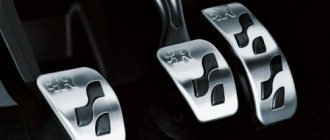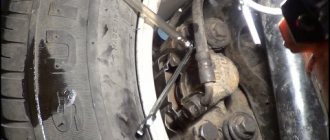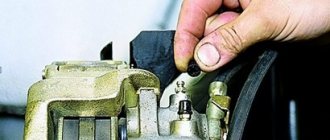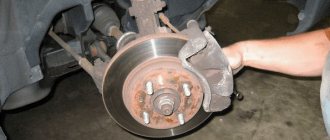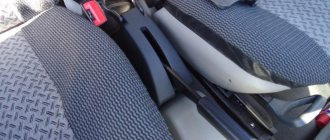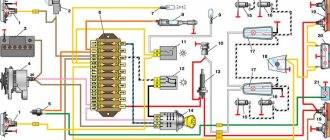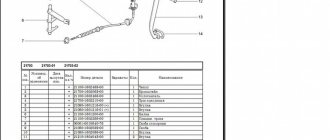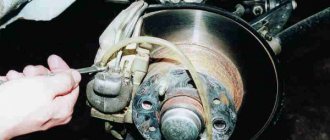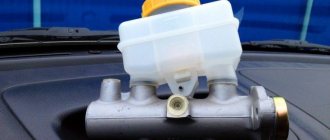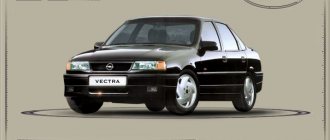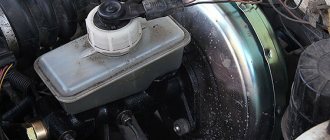Hissing when you press the brake pedal is one of the most common problems encountered in the operation of both domestic and foreign-made cars.
The thing is that most drivers react sensitively to various sounds that accompany the operation of car mechanisms. An exception is the case when a hissing sound is heard when you press the brake pedal.
But it is not always worth panicking - especially in cases where the hissing of the brake pedal when pressed does not in any way affect the efficiency of the braking system. In order to understand the nature of this sound, let's take a closer look at the operation of the vacuum brake booster.
Brakes are one of the main components of any car. And if, when you press the brake pedal, you hear hissing, creaking, the structure itself fails or, on the contrary, is too hard, you need to urgently correct the situation, do not delay or shelve possible repairs. Or at least diagnose the causes of trouble. Knowledge and understanding of the problem leads to its fastest resolution, and timely correction can save you from unforeseen situations on the road.
The level of hissing when you press the pedal - which is normal and which is not
There is a category of drivers who listen very carefully to every slightest squeak or sound and try to hear signs of a breakdown. A car is a mechanical vehicle that contains a sufficient number of components and mechanisms that can create a small permissible noise level. You shouldn’t listen too much to this and go straight to the service center, where, with a lot of persistence, they will definitely find the problem and offer to fix it. The brake pedal, when pressed, in most cases emits a slight hiss.
Vacuum brake booster for VAZ 2109
It must be said that you need to check the brakes for various noises while the car is running. In this case, windows and doors should be closed, and all devices that can make additional noise should be turned off, if possible. A small noise level in the cabin may occur due to the design of the brake system, which, as a rule, has two vacuum chambers. When you press the brake pedal, different pressures arise in them, which is why a slight hiss occurs. If it is minimal and almost imperceptible, then there will be no problems when braking.
If at idle, when you press the pedal, you hear a loud, choking sound or a strong hiss, and it is pressed tightly, then you need to look for problems. First of all, the vacuum booster is checked. A stiff pedal is not a sign of a breakdown of this part, especially in severe frost, but, coupled with hissing, it indicates the need to check it.
The brake system is constantly used by the driver, so the elements of the system are under load. Whatever driving style the driver preaches, over time it is necessary to check the brakes for serviceability. This will ensure the safety of all road users.
The vacuum amplifier has a diaphragm, which over time, like any rubber material, begins to burst and crack. This does not allow it to fully fulfill its functional purpose - to pump up the necessary pressure. The intake vacuum can also fail, but more often this is the first option.
What causes a hissing sound when you press the brake pedal?
Hissing when you press the brake pedal is one of the most common problems encountered in the operation of both domestic and foreign-made cars.
The thing is that most drivers react sensitively to various sounds that accompany the operation of car mechanisms. An exception is the case when a hissing sound is heard when you press the brake pedal.
But it is not always worth panicking - especially in cases where the hissing of the brake pedal when pressed does not in any way affect the efficiency of the braking system. In order to understand the nature of this sound, let's take a closer look at the operation of the vacuum brake booster.
Brakes are one of the main components of any car. And if, when you press the brake pedal, you hear hissing, creaking, the structure itself fails or, on the contrary, is too hard, you need to urgently correct the situation, do not delay or shelve possible repairs. Or at least diagnose the causes of trouble. Knowledge and understanding of the problem leads to its fastest resolution, and timely correction can save you from unforeseen situations on the road.
How to check the vacuum brake booster
The braking system of a car is constantly exposed to loads, and in the so-called aggressive style of driving on city streets, these loads increase exorbitantly. In general, influences of this kind are carried out constantly, even if you prefer a loyal level of speed. Therefore, the brake system must be diagnosed with enviable regularity in order to provide the motorist with the maximum degree of safety. Malfunctions in the vacuum amplifier occur, as a rule, due to the loss of condition of the diaphragm located inside this unit. It may burst or become cracked; there is also natural aging of rubber and loss of its qualities. What's the result? The diaphragm stops forming a vacuum. In some cases, the exhaust valve may also fail.
To check the functionality of the vacuum amplifier, you need to resort to the following manipulations:
- We start the engine and let it run a little at idle until the operating temperature level is reached.
- We stop the engine.
- Depress the brake pedal.
- The first movement will be no different from normal when the engine is running. The pedal must be pressed to the limit, in this case the diaphragm is set and a vacuum is formed.
- Release the pedal and press it a second time. If there are any malfunctions in the vacuum booster, then when you press it again you will feel a characteristic short pedal stroke.
- If the reaction of the braking system is the same as the first time, then everything is in order with the amplifier. When the deviations seem insignificant to you, it is worth examining the supply pipes for the presence of microcracks.
In general, each time you press the brake pedal, the engine speed will decrease slightly, however, if the difference becomes significant, it is worth visually diagnosing the hose connecting the amplifier to the power unit. If it has any defects, the collector will become leaky, and accordingly, you won’t have to count on normal mixture formation and the motor will operate unstable. The solution is simple - change the damaged hose.
Vacuum brake booster - how to diagnose a malfunction
Diagnosing a malfunction of the vacuum brake booster is not difficult; it becomes noticeable - when pressed, the brake pedal becomes hard. But an indirect sign of a malfunction can also be a change in idle speed when the pedal is pressed . This is due to a lean fuel mixture caused by “excess” air entering the engine cylinders, which may even stall if the “suction” is too strong.
Most often this is due to damage to the brake booster diaphragm. And it’s not necessarily due to old age - sometimes the sealing rings of the main brake cylinder leak brake fluid, and it gets into the booster housing.
New vacuum brake booster for VAZ 2109
Some car owners manage to rebuild the brake booster themselves - they even sell repair kits for domestic cars. But, in general, this is a thankless task - the body of the “vacuum generator” is non-separable, and not everyone can carefully and tightly connect its parts.
In addition, the operation of the brake system is also affected by adjusting the protrusion of the “vacuum rod” from the housing - incorrect adjustment can reduce the efficiency of the booster or cause incomplete “release of the brakes” of the working brake cylinders. This method of checking the amplifier is common among car enthusiasts - start the engine after squeezing the brake. When starting the engine, the pedal should go to the floor.
The process of removing the vacuum brake booster
If the booster is faulty, the brake pedal will remain “stiff”. In general, hissing associated with the operation of the vacuum brake booster is normal. But in the case when its volume increases for no apparent reason, get ready to replace the vacuum amplifier before it completely fails.
Replacing the vacuum brake booster on a VAZ 2107 video
Brake vacuum is the most common cause. It’s another matter if the texture of the sound differs significantly from the ear. That is, the hissing turns out to be quite loud and, as it were, choking.
At the same time, when pressing on the brake pedal when it is cold, we feel its movement being excessively stiff. And also - the buoyancy of the engine speed (and sometimes it can stall). In such cases, you should pay close attention to the vacuum booster as a possible cause of the problem.
Well, a tight pedal, of course, could also be due to frost, for example, until the main one warms up. But the revs and a fairly strong hiss are already direct indicators that you need to look under the hood! How to check it?
The car's braking system is subjected to constant loads, and with the so-called sporty style of city driving, it is also subject to overloads. This happens regularly even with a measured and leisurely rhythm - there is no escape from this problem. Therefore, this unit must be regularly tested to ensure maximum driving safety for the driver and passengers. So it is with the brake vacuum story. As a rule, problems with its operation occur due to the failure of a special diaphragm located inside the device.
It bursts, cracks, and ceases to perform its duties—to create a vacuum. Sometimes the exhaust valve also malfunctions. Checking the functionality of the vacuum on their own, available to every driver, is carried out in the following way. We start the engine and let it idle for a while until it reaches ;
- We turn off the engine;
- Press the brake;
- The first press will be no different from the normal one when the unit is running.
- The pedal must be pressed as much as possible: at the same time, the diaphragm in the amplifier is extended and a vacuum is created;
Brake system maintenance
Practice shows that drivers and garage craftsmen ignore proper maintenance of the brake system. This applies to rubber products and particularly rear drums.
What causes the squeaking sound when you press the brake pedal?
In almost every car with a mileage of 150-200 thousand. km, it is worth doing a preventive check of the caliper cylinder, that is, replacing all rubber elements with new ones, which will not only extend the service life of the caliper, but also eliminate the risk of souring or other surprises in its operation.
We are on VK
Published: November 22, 2020
Spread the love How to open a car door in winter? Rain or snowfall and freezing temperatures are enough to freeze car locks. How to open a frozen car then? Humidity in the air and freezing temperatures have never been associated with the smooth operation of a car. This applies, among other things, to locks in which ice plugs form due to subzero temperatures, preventing the key from being inserted. However, the battle […]
see also
Comments 27
Hello everyone, I also have a hissing noise, but not only, if you press the car many times while the car is running, the revs drop! Is the amplifier hose the culprit? or something else?
I don’t even know how I got around to this problem.
Don’t drive, this is the correct operation of a vacuum pump with a switched off car, when you press the pedal after parking the car with the engine switched off, in the membrane cavity the pressure is equalized with atmospheric pressure and if you press the pedal through the check valve, the air is squeezed out of the manifold, which creates a characteristic hissing sound. With the engine running, This cavity is vacuum and when pressed there are no extraneous sounds, which indicates the serviceability of the vacuum and the integrity of the membrane, after the engine is turned off, the valve holds vacuum in the amplifier for some time and when the pedal is pressed, it does not make any sounds, but after parking, the sound when pressed will be repeated.
Okay, so I won’t get too worked up about this.
Don’t drive, this is the correct operation of a vacuum pump with a switched off car, when you press the pedal after parking the car with the engine switched off, in the membrane cavity the pressure is equalized with atmospheric pressure and if you press the pedal through the check valve, the air is squeezed out of the manifold, which creates a characteristic hissing sound. With the engine running, This cavity is vacuum and when pressed there are no extraneous sounds, which indicates the serviceability of the vacuum and the integrity of the membrane, after the engine is turned off, the valve holds vacuum in the amplifier for some time and when the pedal is pressed, it does not make any sounds, but after parking, the sound when pressed will be repeated.
Please tell me, I have a VAZ 2112 There was also hissing from the vacuum tank, before that the liquid was a little less than half, I topped it up but overfilled it (since everything was going back and was not visible) The next day I stopped by and bought a syringe, pumped out the liquid and now it’s exactly along the line , but there was such a problem! When I press the Brake on the move and without releasing the curls, I press it again, they seem to disappear, as if they were not pumped
When you press the pedal again, does it become hard or does it collapse? And where does the fluid go? If the wheels are dry, then look between the cylinder and the vacuum seal, there may be a main leak... then change the main one and it is advisable to change the vacuum seal as well, because the liquid most likely got on the membrane and it won’t last long enough…
The pedal becomes hard and the car barely stops. Pressing it again is normal. And this only happens on a hill or descent.
When you press the pedal again, does it become hard or does it collapse? And where does the fluid go? If the wheels are dry, then look between the cylinder and the vacuum seal, there may be a main leak... then change the main one and it is advisable to change the vacuum seal as well, because the liquid most likely got on the membrane and it won’t last long enough…
And a check was displayed, I started checking, it turned out that the mixture was lean, I was looking for where it was sucking in more air.
With the engine running, gently press the brake and listen...it will hiss and the speed should rise
Is this how you can find where the air is blowing?
If the vacuum pump is in trouble, then you will hear it... if the speed does not change and there is no hissing, then try changing the valve on the vacuum pump, the one on the hose...
With the engine running, gently press the brake and listen...it will hiss and the speed should rise
Logan - unusual squeaking noise when braking. Renault forum
The creaking is interesting - it is tied to the movement of the pedal, and not to deceleration (the front pads are new for 2 months, and the creaking appeared recently), i.e.
Every time you press the pedal, there is a short squeak (similar to the squeak of the turn signals) when the pedal passes a certain point of travel, even standing still you can squeak, if you pump the brake pedal the squeak is loud, not rubbery, the localization is incomprehensible (either from the pedal, or from the right in front somewhere ) there seems to be a dependence on warming up (it appears with warming up/driving)
Should I lubricate the pedal with a Vedashka or does anyone have a ready-made diagnosis?
Main reasons
First, let's look at how the mechanism works when braking.
The brake system has a vacuum booster. The vacuum structure consists of a brake pedal pusher, a hose, an air and check valve and an outlet to the brake master cylinder.
When braking, the pusher acts on the air valve. The valve rises and air leaks into the amplifier. The air mass presses on the diaphragm. The latter acts on the cylinder. A hissing sound occurs when a mass of air penetrates the structure.
During operation, the diaphragm bursts, tears and does not perform its functions. In this case, air enters the structure, allowing brake fluid to enter.
Damage to the vacuum booster and air in the system is the reason why noise is heard.
Hissing when you press the brake pedal is not always a consequence of problems. A slight hiss is considered normal and does not affect the functioning of the braking system.
Hissing sounds when pressing the brake pedal - causes, troubleshooting
Safe driving can only be achieved if all the mechanisms in the car work properly. One of the most basic elements in a vehicle is the braking system. With its help, the driver can regulate the speed and stop the car if necessary. The operation of this system affects the safety of drivers and passengers while driving.
Very often, car owners are faced with the problem of extraneous sounds in the car. It is important to react to this in a timely manner. If any sound was also present before, but in a less weak expression, it is necessary to carry out diagnostics and establish the cause.
As a rule, a concomitant factor may be a strong subsidence of the pedal and the absence of its return to its original position. You may also encounter a situation where the brake pedal, on the contrary, becomes very tight when pressed. The hissing sound may be accompanied by an unpleasant squeaking or vibration. Let's consider what may be the reasons for the appearance of sound and how to get rid of it.
Main reasons . Before this, it is necessary to recall the principle of operation of the braking system. This mechanism has a built-in vacuum booster, which consists of an element for pushing the pedal, a hose, valves and a hole leading to the brake cylinder.
When the driver presses the brake pedal, the pushrod acts on the air valve, which rises and allows air to flow into the booster. Air currents compress the diaphragm, which drives the cylinder. A hissing sound may occur as air passes through the structure.
During operation, the diaphragm may burst and not perform its functions. If this happens, air can penetrate the structure and allow brake fluid to pass through.
The very first cause of a hissing sound is damage to the amplifier. However, many car owners immediately rush to a service center when the slightest noise occurs. A hissing sound when pressing the brake does not always indicate the presence of any problems. If it is barely audible, the functioning of the braking system is not in danger.
How to diagnose . Every car owner can check a car for these breakdowns without contacting a service center.
Diagnostics should be carried out with the engine turned off. But first you need to let it gain momentum and heat up to maximum temperature. After this, you need to turn off the engine and press the brake all the way. And you need to do this 2 times, since the first click will not help find the problem.
When the driver presses the brake pedal a second time and feels stiff, it means there are problems - you need to fix them yourself or contact a specialist.
How to fix the problem . As a rule, the vacuum booster is repaired by specialized services, since it is a non-separable mechanism. Most often, it is not even repairable - a complete replacement is required. To prevent it from breaking in the future, you can combine all parts of the element together.
Bottom line . The appearance of pronounced hissing sounds when braking indicates problems in the braking system. The car owner can independently diagnose the car, but it is better to entrust troubleshooting to professionals, since the safety of all passengers in the car depends on proper repairs.
- Camp Jeep: when the coolest off-road vehicles gather in one place
See all photo news >>
Diagnostics
You can diagnose such breakdowns yourself. The test is carried out with the engine running.
While the engine is revving, the temperature reaches the optimum level. After this, you need to turn off the engine and depress the brake pedal all the way. The first squeeze does not diagnose breakdowns. You will need to press the pedal again... If the second time you press the pedal, you feel the pedal move hard, then you should get under the hood or take the vehicle to a service center.
In addition to carrying out these manipulations, we pay attention to the hose that goes from the vacuum to the power unit. A worn out hose indicates the need for replacement.
Causes of squeaking car brakes
The cause of squeaks can also be an overheated support disk as a result of intensive use. Overheated metal may lose its shape and begin to touch the brake system components. For safety reasons, it is worth replacing such shields with new ones.
What causes the squeaking sound when you press the brake pedal?
The squealing noise can also be caused by a foreign object, namely a pebble caught between the casing and the disc. This is a fairly common phenomenon in vehicles driven off-road. Then the noise occurs not only during braking, but also without it. Sometimes this noise goes away on its own, but it is worth remembering that it destroys the disk by cutting a depression in it.
Troubleshooting
The vacuum amplifier is quite difficult to repair on your own, because... it is a non-separable mechanism. In order for it to work properly in the future, it is necessary to firmly connect all parts of the device , which not everyone can do.
Adjusting a repaired device requires special care. The performance of the amplifier depends on the repair. If it is not adjusted correctly, the likelihood of incomplete braking of the vehicle increases.
Damage to the amplifier cannot be repaired. In this case, the structure must be completely replaced.
How to replace the vacuum booster on a VAZ 2110-2112 if the brake pedal hisses - in the video
Malfunctions of the car brake assembly prohibit the use of the vehicle. Panic when damage occurs does not solve problems. Therefore, car owners must understand the cause of their occurrence and diagnose them correctly.
Causes of brake noise when braking
The characteristic grinding of brakes can regularly appear during the rainy season, when there is a lot of moisture. A thin layer of corrosion appears on the surface of the disc, which wears off with increased noise. Usually the phenomenon disappears after several braking sessions.
What causes the squeaking sound when you press the brake pedal?
Squeaks that turn with the effect of vibrations into beating of the steering wheel or brake pedal can be caused by difficulty in moving the caliper piston, uneven working surface of the disc, improper assembly of the brake drum, incorrect position of damping elements (for example, washers) or too small thickness of the discs.
There can be quite a few reasons for differential sounds during braking, but if you hear something strange when braking, contact a service station.
Vacuum booster diagnostics
Diagnostics of a car vacuum booster
If the brake booster does not work, it becomes noticeable - the brake pedal becomes hard . But an indirect sign of a malfunction can also be a change in idle speed when the pedal is pressed. This is due to a lean fuel mixture caused by “excess” air entering the engine cylinders, which may even stall if the “suction” is too strong.
If the brake booster does not work, this becomes noticeable as the force required to press the pedal when braking increases.
Most often this is due to damage to the brake booster diaphragm. And it’s not necessarily due to old age - sometimes the sealing rings of the main brake cylinder leak brake fluid, and it gets into the booster housing. Some car owners manage to rebuild the brake booster themselves - they even sell repair kits for domestic cars. But, in general, this is a thankless task - the body of the “vacuum generator” is non-separable, and not everyone can carefully and tightly connect its parts. In addition, the operation of the brake system is also affected by adjusting the protrusion of the “vacuum rod” from the housing - incorrect adjustment can reduce the efficiency of the booster or cause incomplete “release of the brakes” of the working brake cylinders. This method of checking the amplifier is common among car enthusiasts - start the engine, first squeezing the brake. When starting the engine, the pedal should go to the floor. If the booster is faulty, the brake pedal will remain “stiff”. In general, hissing associated with the operation of the vacuum brake booster is normal. But in the case when its volume increases for no apparent reason, get ready to replace the vacuum amplifier before it completely fails.
Functions
- Firstly , the booster makes it easier to control braking and, accordingly, increase driving comfort for the driver.
This function is carried out by significantly reducing the load on the brake pedal (the VAZ 2114 uses a fairly modern unit that still meets strict safety requirements).
Reducing the force allows the driver to control braking more comfortably and optimally distribute the force on the brake pedal.
- Secondly , it helps reduce the braking distance of the car. This reduction critically depends on the model, year of manufacture and wear of the brake system as a whole. The average reduction using an amplifier is about 35-45%.
On video of the vacuum brake booster of the VAZ 2114:
Possible causes of squeaking brake system
The squeak that occurs when you press the brake pedal in the operation of the braking system is a special type of resonance with a changing frequency, which appears from vibrations of moving parts of the braking system. These vibrations and resonance are always there, and when the frequency falls into the audible range, our ear perceives it as a creak, a squeak of various tones.
This effect is often used by manufacturers to create a mechanical warning system about maximum brake pad wear. Before serious repairs, you should make sure that the cause of the squeaking brakes does not lie in the operation of this system.
If a squeak appears when you press the brake pedal, the first thing you need to do is find out what kind of pad wear system is installed on the car.
Even in modern cars, the manufacturer installs not an electronic one, but a classic, mechanical one, since it is still more reliable. It works like this: a metal plate of a certain length is attached to the inner pad (it always wears out more) and when the pads are worn out to the maximum, this plate begins to touch the brake disc (without scratching or damaging it) and produces a strong and nasty squeak when the brake is pressed. It is impossible to drive like this without replacing the pads and the driver is forced to contact a service center or service station.
